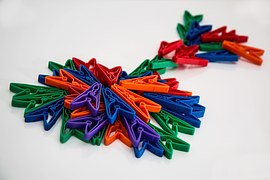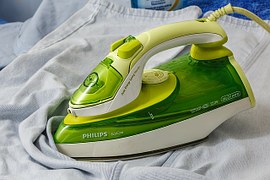Simple chores for toddlers
Tasks for toddlers are all about teaching them to control their own environment. Once they can walk they will select and bring out the toys they want to play with. Soon your living space will be cluttered with their play equipment as their attention moves from one toy to another. They are probably too young to understand a rule about putting one toy away before they bring out another, but it is not too soon to introduce the custom of tidying up at the end of the day, before bath and bedtime. This means providing storage shelves or boxes that they can easily access and manipulate, and it will soon become an accepted routine. Toddlers will also enjoy handing out pegs at the clothesline, sweeping up dry spills in the kitchen and dead leaves in the garden, and snapping the heads off flowering weeds in the lawn before they turn to seed.
Toddlers will also enjoy handing out pegs at the clothesline, sweeping up dry spills in the kitchen and dead leaves in the garden, and snapping the heads off flowering weeds in the lawn before they turn to seed.
Household tasks for primary school children
By the time they start school most children are ready to understand their responsibilities as a member of the family and the wider community. Their teacher will certainly instill this notion if you haven’t already done so. Rather than letting them have the impression that everything will be done for them forever with no exertion required on their part, gently introduce the idea of shared obligations. Mom and Dad go out to work to feed the family and put a roof over their heads, asking only love in return, but their children can be invited to show their appreciation in many ways.
They can, for example, keep younger siblings amused by playing with them or reading to them. In the morning they can straighten their bed, especially if it is an easy-to-handle combination of fitted sheet and comforter. Once a week they can tidy their bedroom properly and offer it for parental approval. Garden tasks could include sweeping paths and driveways, watering plants and even removing weeds from small areas. Parents may choose to link the completion of some of the regular tasks with pocket money privileges.
Family duties for teenagers
Teenagers are more than ready to understand that effort brings reward. They can see that their parents work hard, and you will be doing them a disservice if you do not teach them to play their part in family responsibilities. As well as making their bed and keeping their room tidy they should be able to help with meal preparation and cleaning up afterwards. They may even talk to you while they join you in these tasks, which is an added bonus.  In a household where both parents work full time, they may choose to instruct their teenage children in the correct and safe performance of tasks like ironing, car washing and lawn mowing, and pay them to complete them instead of seeing the cash disappear to an outsource beyond the home. This will depend on personal viewpoints and family politics, but it is worth considering.
In a household where both parents work full time, they may choose to instruct their teenage children in the correct and safe performance of tasks like ironing, car washing and lawn mowing, and pay them to complete them instead of seeing the cash disappear to an outsource beyond the home. This will depend on personal viewpoints and family politics, but it is worth considering.
Whatever age your children are, there are always some tasks that are within their abilities. It is less a question of easing the burden for parents, and more an issue of giving them the best start in life by introducing them to the idea of personal responsibility and pride in achievement.
